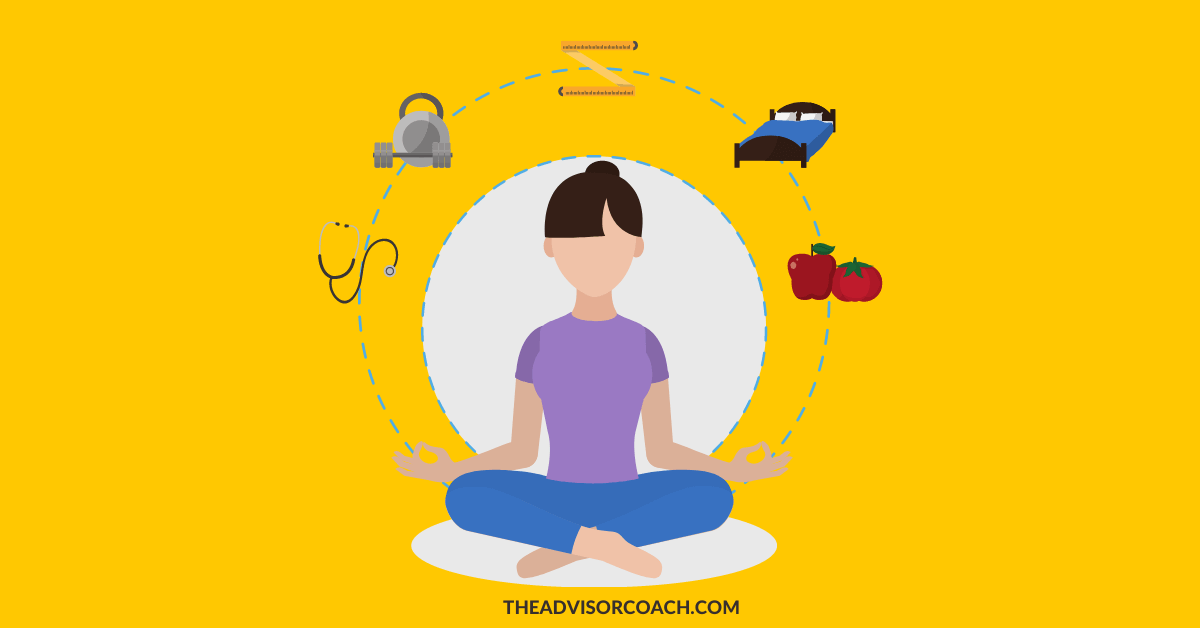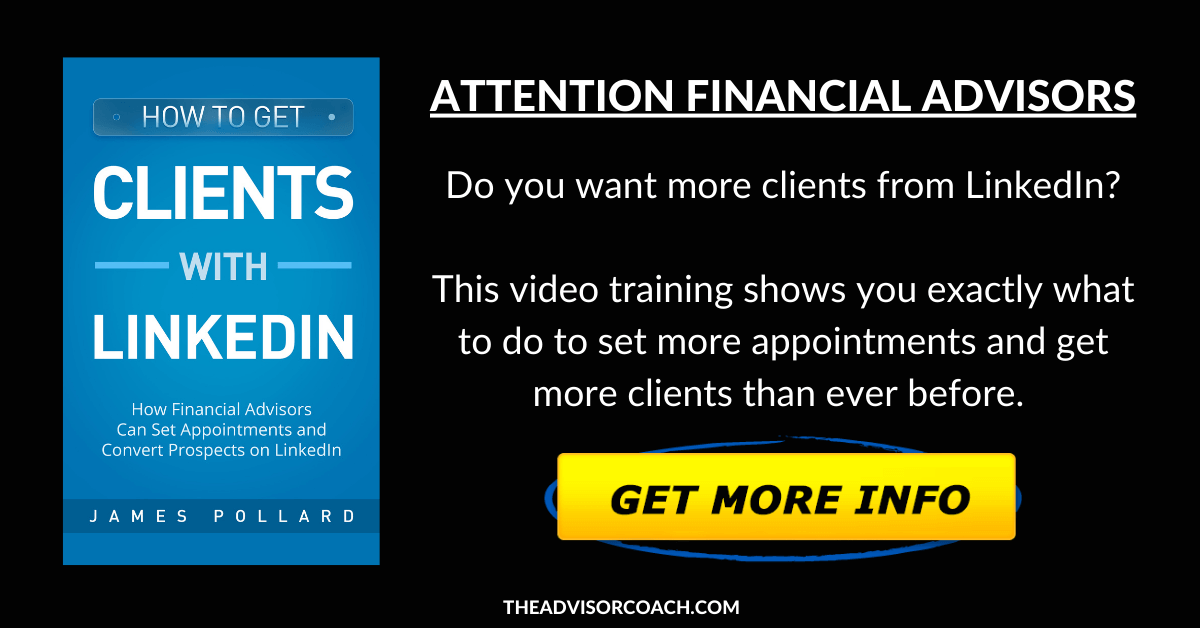These 5 "Weird" Tips Can Help Financial Advisors Form Better HabitsNOTE: If you’re a new financial advisor, make sure you check out Your First Year As A Financial Advisor, where I reveal several things every new financial advisor ought to know.
“Chains of habit are too light to be felt until they are too heavy to be broken.” - Warren Buffett Your habits are the small decisions you make and actions you take on a regular basis. Habits make up a double-edged sword because both good and bad habits become very difficult to break once they’re ingrained in your life. In Buffett’s words, they become “too heavy to be broken.'' Depending on the study you read, nearly half of your behavior on any given day is a result of your habits. This means your life is essentially the sum of your habits. Where are you now? Are you where you want to be? You can thank your habits for your success, or lack thereof. Your habits - what you do repeatedly - ultimately form the person you become. That’s why, to help you become a better financial advisor, I’d like to share a few tips to help you form better habits. These tips are “weird” in the sense that most people don’t do them. So, if you want to form better habits, you’ve got to become a little weird. Alright, you weirdo. Here's a peek at what's in this article... 1. Choose Your HabitsMost people operate randomly. Their habits merely “happen”, with no intention or thought whatsoever.
Because habits can help streamline your progress towards your goals, it’s in your best interest to choose habits that serve you. For example, if you want to write a book and use it to build your business, then it makes sense for you to form the habit of writing every day. However, don’t try to bite off more than you can chew. Research shows that one of the biggest mistakes people make with habits is that they try to do a bunch of stuff at once. This is why New Year’s resolutions often fail; people attempt to make several changes at once. Pick one habit you’d like to develop and focus on it until it becomes automatic. I suggest picking a habit that has a ripple effect in other areas of your life. A habit I chose to develop is going to bed at a consistent time each night. This allowed me to get better sleep, which allowed me to have more energy, which allowed me to help more financial advisors, which allowed me to grow The Advisor Coach, and so on. Notice how I didn’t try to directly improve all the other areas at once. They were all impacted by fixing my sleep. This is also called “The Domino Effect”, which states that when you make a change to one behavior, it will cause a chain reaction which impacts other behaviors. A 2012 Northwestern University study found that when people became less sedentary, they also reduced their daily fat intake… even though they were never specifically told to eat less fat. Their improved diet habits occurred as a natural side effect because they spent less time lounging around and mindlessly snacking. But like I said, your habits are a double-edged sword and “The Domino Effect” also occurs with negative habits. Let’s say you get fast food once a week because you’re too tired to cook. Suddenly, it becomes “normal” for you to get fast food whenever you’re tired. You gain weight, which makes you feel even worse, so you spend more time sitting on the couch. Be intentional about your habits and remain cautious about the flywheel of negative habits that may be building in your life. ALSO READ: 7 Actionable Goal Setting Tips For Financial Advisors 2. Control Your EnvironmentThis is perhaps the best tip I can give anyone on forming better habits.
By controlling your environment, you make it easier for you to complete your good habits and more difficult for you to complete your bad ones. In my experience, many advisors work like this:
A study by global tech protection and support company Asurion found that average Americans check their phones once every twelve minutes. One in ten check their phones every four minutes. Guess what? You can’t dilly-dally with your phone if you don’t have your phone with you. One of the best things I’ve ever done for my personal productivity is to get rid of my phone. When I’m working, I keep it in a different room. You can also change your digital environment. Delete your apps. Do you really need the Burger King app sending you a push notification every time there’s a discount on Whoppers? Install a website-blocking app to automatically block social media sites after a predetermined time limit. As you begin to control your environment, pay attention to your “defaults”. If you sleep with your phone next to your bed, then checking your email first thing in the morning is likely to be your default option. However, if you set up your CRM to automatically open when you open your browser, you’re more likely to follow up with prospects. Also, prime your environment to make your desired actions easier. For example, cleaning your office at the end of the day is a great way to prime your environment because you’re reducing the friction of getting started the next day. Another way to prime your environment is to create a to-do list at the end of each day. I write out a to-do list every night and leave it on my desk so I see it first thing in the morning. All I have to do is take a look at the list and I hit the ground running. People who work out every morning (I’m one of those rare birds who likes working out at night) tell me they kick-started that habit by packing their gym clothes in a bag the night before so it’s easy to grab the bag and go to the gym. Some people even sleep in their gym clothes. Your environment influences EVERYTHING. I can’t possibly overstate this. If you use a bigger plate, you’ll eat more. If you have a takeout place on speed dial, you’ll order out more. If you don’t have a dedicated work space, you’ll work less. If you’re surrounded by whiners and complainers, you’ll whine and complain more. 3. Start SmallOne of the most interesting concepts I’ve ever heard about building good habits comes from Stanford professor BJ Fogg. It’s called the “motivation wave” and it goes like this…
A motivation wave is a time when you’re feeling empowered and motivated to reach your goal. Many people experience a motivation wave when they first get interested in personal finance. They read a bunch of blogs, read books, and subscribe to podcasts about personal finance. They might even pay off some credit card debt, set up an automatic savings program and open a brokerage account within two weeks. The bottom line is that when this motivation wave hits, you want to take as much action as you can. If you feel “on” one day, start reaching out to your prospects and clients. Don’t stop. Keep your momentum going for as long as you can and it’ll pay off in spades. That’s why it’s easy enough to pick a habit that’s easy enough to start. It may seem daunting to do one hundred push-ups per day but if you set a goal to do ten push-ups during the commercial breaks of your favorite show, it becomes a lot easier to do. I see this a lot with financial advisors who want to make more cold calls. Often the hardest part is getting started. The whole concept of call reluctance is based around this idea. However, once advisors start and gain some momentum, they’re more likely to keep going. Another reason it’s okay to start small is because you can grow your habits by small percentages and watch them compound over time. For example, some financial advisors are overwhelmed by the idea of implementing an email marketing system to help them get more clients. To help them conquer this overwhelm, I encourage them to write one email per week, then once every few days and finally once per day until they have an autoresponder system that works for them whether they’re sleeping, working, or on vacation. 4. Track Your HabitsIf you’re a regular listener to my podcast (the “Financial Advisor Marketing” podcast) then you know I religiously track my time with Toggl. I also track my time with an Oura ring and I track my diet with an app called LoseIt.
However, you don’t need to use any fancy apps or extensions if you don’t want to. Tracking your habits can be as simple as using a pen and paper. Jerry Seinfeld used this tip to break into the comedy business. He got a large wall calendar and put it in a spot where he would see it every day. Then, he got a big red marker. Every day that he would write, he would put a big red “X” over that day. After a few weeks, he would have a chain. His secret to success? “Don’t break the chain.” He’s told reporters that he’s used this technique over the years for many different areas, including exercising, learning programming, building successful businesses, and more. This idea is directly applicable to financial advisors. Every day that you follow up with prospects, track it. Every day that you complete your prospecting behavior, track it. Here are a few reasons why tracking your habits is so important:
ALSO READ: 10 Of My Favorite Productivity Tools For Financial Advisors 5. Don't Get Discouraged If You Fall Off The WagonEvery streak ends at some point. Don’t feel bad when it happens.
One of my daily habits is sending an email out to my main list. I’ve done this every single day for YEARS. I remember missing a day because my email automation software was down and I felt terrible. However, I kept reminding myself that it was out of my control and that, had the software been up, I would’ve sent the email. Otherwise, emergencies happen. If your car breaks down next to a fast food joint and you’re starving while waiting for a tow truck, it’s okay to have a burger and fries. But here’s the thing… Failing ONCE is an accident. Failing TWICE is a new habit. Sadly, people typically fall into an all-or-nothing cycle with their habits. If they slip up and have a cookie, their minds start rationalizing why it’s okay to have a whole tray of brownies. If financial advisors skip their marketing for a week, they may start to think, “Hey, the world didn’t come crashing to an end… maybe I don’t need to do this marketing thing…” and then two months later it bites them in the gluteus maximus. Also, don’t be too hard on yourself if you fail early in the process. Lots of people mistakenly believe that it takes 21 days to form a new habit. However, Phillippa Lally, a health psychology researcher at University College London, found that it takes an average of 66 days to form a new habit. 66 days, not 21. And how long it takes to form a new habit varies widely on the behavior itself. In the study, it took anywhere from 18 days to 254 days to form a new habit. However, financial advisors who believe the “21 days” myth treat themselves as abject failures if they haven’t mastered their habits in three weeks. So, set your expectations appropriately and get back on that wagon if you fall off. About The Author...
Hey, I'm James Pollard. I'm the guy behind this website.
I've dedicated my career to empowering financial advisors to unlock their full potential. With a passion for marketing and a knack for cutting through the noise, I provide actionable strategies and insights that help financial advisors build better businesses. I'm also the host of the popular Financial Advisor Marketing podcast. Beyond the mic, I'm constantly sharing my expertise through The James Pollard Inner Circle™ newsletter, which has grown to become one of the most successful communities in the financial advice space. Thanks for stopping by and diving into my world. If you'd like to connect with me on LinkedIn, here is where you can find me. |



